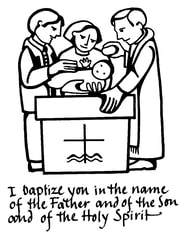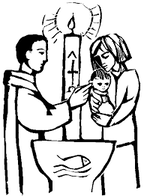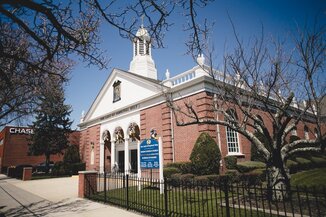Sacrament of Baptism
|
What is Baptism?
Baptism is the first of the three Sacraments of Initiation (Baptism, Confirmation, Eucharist). When a person is initiated into the Church, that person is joined to Jesus Christ’s death and resurrection and is made part of the holy People of God, the Church. The three Sacraments of Initiation together bring Christ’s People to His full stature, enabling them to carry out their mission in the world. Baptism, as the first sacrament, is the door to life, uniting us to Christ and to the Church. As the waters of Baptism cleanse us and renew us, they wash away the stain of sin, original and personal, and make us sharers in the very life of God. How do I go about getting my child baptized? Parents are to baptize their children in the home parish where the family resides and attends Mass each and every Sunday. Parishioners of OLPH (those who live within the parish boundaries, or those outside the boundaries who, after meeting with one of the priests of the parish, have officially registered in the parish) may begin the process of baptizing their children by calling the rectory and mentioning they would like to celebrate Baptism. Parishioners of other parishes should contact their home parish. As a result of this initial call, an appointment will be set up with one of the priests. It’s as simple as that. What is required of me in order to baptize my child? You will be asked to come in to have a meeting with one of the priests, so that we can discuss with you in person the serious responsibility of having your child baptized. There will be some simple but necessary paperwork to fill out, which the priest will do with you. If you live within the boundaries of OLPH parish but are not officially registered, you will be asked to complete a census form so we can register you. How do I schedule the Baptism?
Baptisms are celebrated on the second and fourth Sunday of each month at a 2:00 p.m. ceremony in the church, which will last anywhere from one-half hour to one hour, depending on the number of babies being baptized. You can choose which Sunday you would like to attend; this is discussed with the priest at your appointment. The priests and deacons at OLPH do not do “private” or “individual” baptism ceremonies. The communal meaning of the sacrament means that it should take place in the communal context of the parish ceremony. The only exceptions to this would be due to health requirements of the child or the mother, or a request due to a priest or deacon friend or relative who would like to come to OLPH to celebrate the Baptism. What if I’m a single parent, or if I’m in a marriage not recognized by the Church?
None of those types of situations will prevent your child from being baptized. All that’s required is that you have the sincere and honest intention to raise the child in the faith and that you will be a good witness to the faith. As long as there is good reason to believe that the child will be raised in the Catholic faith, the baptism can take place. However, part of being a good witness and raising a child in the faith means living your life in the way the Church asks. So, if there is some situation that should be taken care of — if, for example, you are in an invalid marriage — then the priest will gently talk to you about the possibilities for clearing up that irregularity. All of these situations and others like them can be discussed in your meeting with the priest. Vertical Divider
|
Is there any “class” I have to go to?
We ask parents who have not attended a Baptism Preparation Session within the past three years to attend a class. Godparents are invited but not required to attend. These sessions are held on the first and third Thursdays of each month, excluding Thursday holidays. You can choose to go to any session as long as it is before the date of the Baptism ceremony, and you choose this date during your meeting with the priest. What are the rules concerning godparents? If there are to be two godparents, one must be male and one must be female; two males or two females cannot both be godparents for the same child. The parents of the child cannot be godparents. It is permissible for a child to have only one godparent, i.e., only a godmother or a godfather. Those who are to be godparents must be Catholics who are at least sixteen (16) years of age, have received the three Sacraments of Initiation (Baptism, Confirmation and Eucharist), and who are living a life consistent with faith and with the responsibility of a godparent. The priest will speak to you more about the requirements for godparents during your appointment. It is possible that a baptized and believing Christian who is not a member of the Catholic Church may act as a Christian witness along with a Catholic godparent; you may speak to the priest about this if this is your request. However, an unbaptized person (e.g., someone who is Jewish, Muslim, or an atheist) may never act as a godparent or witness. What happens during the Baptism ceremony? The liturgical rite of Baptism has four parts to it: 1. Reception of the Children During this first part of the rite, the parents and godparents express their desire to have the child baptized and they acknowledge the important responsibility they are undertaking in requesting to have the child baptized. During the part of the liturgy, the sign of faith is given to the children for the first time as the sign of the cross is traced on the forehead of the child. 2. Liturgy of the Word Next, God’s Word is proclaimed in selections from holy Scripture (the Bible). All who hear God’s Word are stirred up in their faith as God speaks to all gathered through His Word. Also during this part of the ritual, intercessory prayer is offered, the intercession of the Saints is invoked, and the children to be baptized are prayed over and anointed. 3. Celebration of the Sacrament In this part of the ritual, the water of baptism is blessed, the parents and godparents renounce sin and profess their faith, and the children to be baptized are washed in the waters of regeneration as they are baptized “in the name of the Father, and of the Son, and of the Holy Spirit.” Certain rites follow the washing with water: the anointing with Sacred Chrism; the placing of the white garment; and the handing on of the lighted baptismal candle. All these signify the new life of Christ into which the newly-baptized child has been reborn. 4. Conclusion of the Rite The Lord’s Prayer (Our Father) and a blessing and dismissal conclude the liturgy. |





